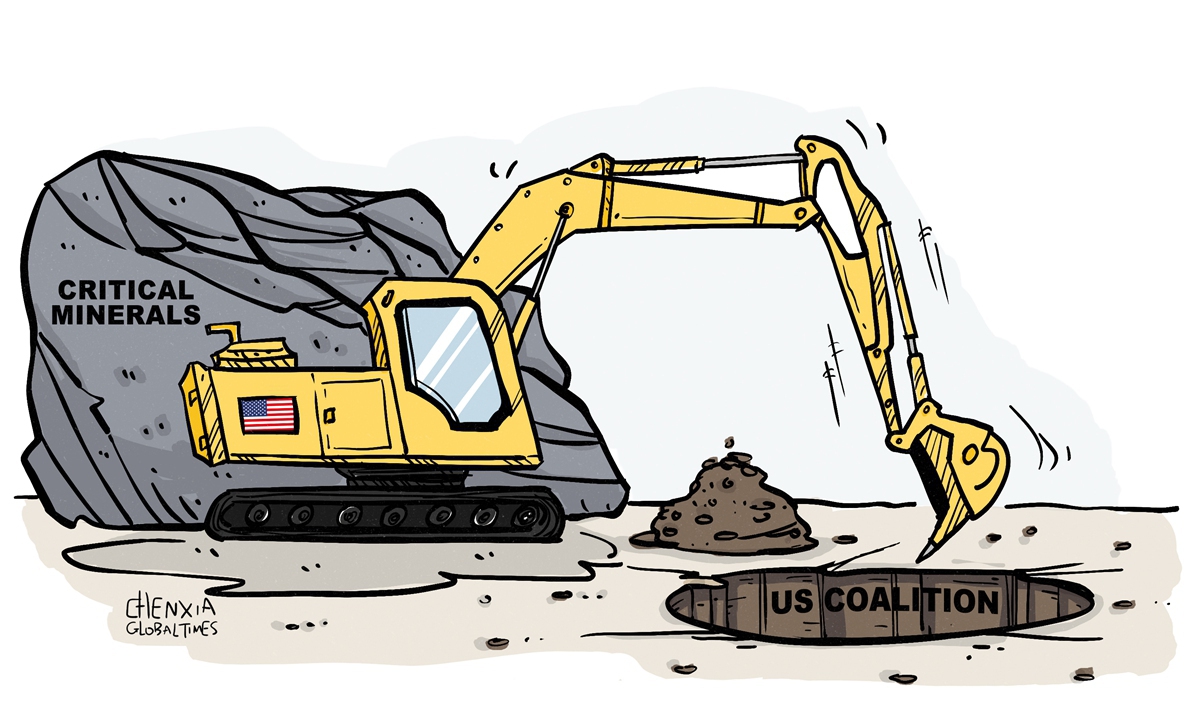
Illustration: Chen Xia/GT
The US, seemingly overlooking the natural outcomes of global interconnectedness, has been attempting to sever its industrial and supply chain links with China, particularly concerning essential minerals like lithium. This approach poses risks to the global industrial landscape and could lead to increased fragmentation and inefficiencies in supply chains worldwide.
US Department of State Under Secretary Jose Fernandez alleged recently that China was producing much more lithium "than the world needs today, by far," causing a "predatory" price drop as it seeks to eliminate competing projects, Reuters reported on Tuesday.
At a time when the US and its allies are ramping up lithium production, accusing China of excessively supplying lithium is clearly untenable and unreasonable. The US official's complaint highlights the intense competition between China and the US in the lithium new-energy sector and underscores the worrying challenges confronting global industrial and supply chains.
Lithium, as a critical raw material for emerging industries such as new-energy vehicles and energy storage systems, holds immense significance in today's economy. China, with its abundant lithium resources, a well-established industrial chain and strong manufacturing capabilities, has secured a prominent position in the global lithium resource market.
From ore extraction to refining and processing, and then to the manufacturing and application of lithium batteries, China has developed a strong competitive advantage in this field. This enhances China's industrial capabilities as well as contributes to the optimization and upgrading of the global industrial chain in the long run.
Meanwhile, as Chinese producers work to consolidate and strengthen their position in the global lithium industry, they have gradually established their own pricing mechanism. The mechanism takes into account production costs and market demand, and it integrates the needs of China's development and global trade, particularly in relation to trade and economic ties with the US and other Western countries.
However, in the face of the strong competitiveness of Chinese lithium products in the international market, the US and its allies are attempting to establish a "small circle" supply chain system as part of their broader strategy to "decouple" from China. This attempt appears to be aimed at enhancing their economic security and supply chain resilience, but in reality, it exposes the conflicts in their approach.
On the one hand, the US seeks to forge an industrial chain alliance with like-minded countries to counter China's rise, aiming to stifle China's progress in high-tech sectors through strategic supply chain "decoupling."
On the other hand, the reality is that the US and its allies face significant challenges in establishing a comprehensive industrial and supply chain system that can rival China's capabilities in the short term. This is particularly evident in their continued dependence on China for critical raw materials, which underscores the complexities and difficulties of their "decoupling" efforts.
This strategic contradiction fails to effectively address the current issues of industrial competition and may exacerbate fractures in the global industrial chain, leading to heightened tensions in economic relations among countries.
The global industrial and supply chains are essentially an interdependent system, where countries achieve optimal resource allocation and complementary technological development through cooperation. Any unilateral attempt to disrupt this system could inflict significant damage to their own economies and the global economy and potentially trigger broader economic turmoil and instability.
In this context, the US approach - to rally a group of allies to establish an alliance of industrial and supply chains to counter China and curb the development of China's industrial chain - risks undermining the integrity of global industrial and supply chains. It may also result in significant resource waste and diminished efficiency. Ultimately, the US and its allies may find themselves ensnared in a self-sufficiency dilemma, struggling to fulfill their own demand for high-tech products.




